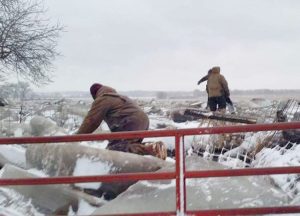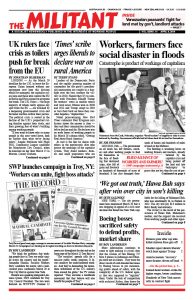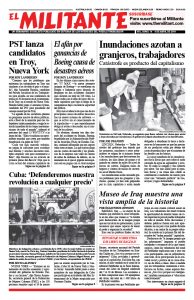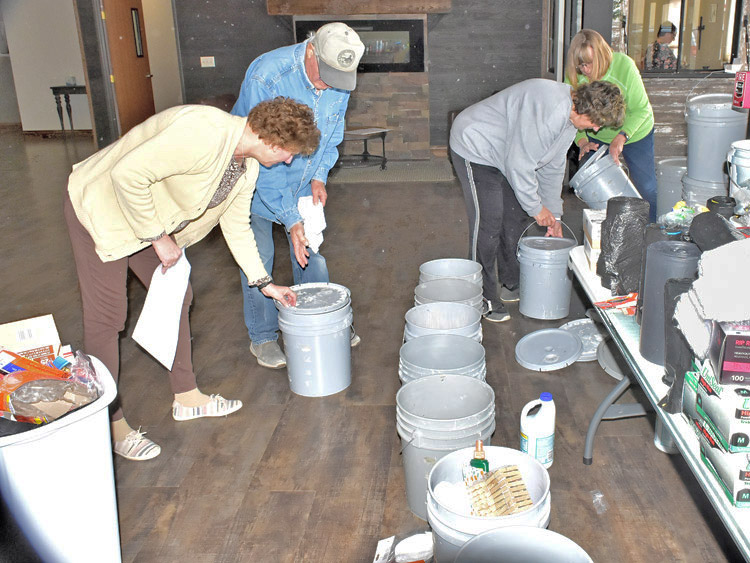LINCOLN, Neb. — The government on all levels has left farmers, ranchers and other working people to fend for themselves in the face of flooding that destroyed crops, silos full of grain and livestock on hundreds of thousands of acres of farmland. It has also damaged thousands of homes and hundreds of miles of roads in the Midwest.
The flooding is wreaking havoc on working farmers and ranchers, already battered by the capitalist crisis and being pushed off the land and into bankruptcy by prices that are less than the cost of production and by growing debts to banks.
The cause of the flooding was rain that fell on ground saturated by water in September and October. The ground froze and was topped off by snow. With nowhere else for the water to go, more rain and warmer weather combined in mid-March to create a “perfect storm” of overflowing rivers, streams and lakes.
Some of the flooded farmland had been created in the 1940s and ’50s with the transformation of the Missouri River into a deeper, narrower channel for river shipping. The low-lying flood-prone land was sold to farmers at low cost.
The flooding was made worse by levees and dams that were not in good shape, by lack of coordination between government departments, and policies that many farmers say favor protecting wildlife over farming and homes.
While the authorities urged farmers to prepare, they were left to themselves to meet the social catastrophe that unfolded. In other words, this “natural” disaster is a social and economic disaster because of the normal every-man-for-himself workings of capitalism.
In the face of government inaction, working people, small business owners and others extended solidarity and pitched in to help each other out.
The Lincoln Journal Star reported how cattle rancher Jeremy Mahon in Boyd County rescued one neighbor with his tractor, which at one point floodwaters spun around 180 degrees. He switched to a boat to save three more. Mahon lost some 60 cows and calves.
His neighbor, Bob Crosley, pitched in after the storm, loaning Mahon a tractor. Volunteer cowboys from the Professional Bull Riders club showed up with horses and two borrowed airplanes so he could check on his livestock.
Working-class solidarity
In a display of solidarity, thousands of working people across the states of Nebraska and Iowa did the same, helping sandbag ahead of the floods. Boats traveled the streets of flooded towns ferrying residents to safety.
“All of us neighbors are working together, and that’s how we’re going to get through,” Mahon told the Star.
Rancher Clint Pischel, 23, of Niobrara, told the New York Times that he spent all day March 18 gathering 30 dead calves he found under chunks of ice after his family’s ranch was flooded when a dam failed.
Now he worries how to pay off loans. “With death and everything else, you’ve got to answer to bankers,” he noted. “When you’re losing money to start with, how do you take on extra losses?”
Across the Midwest farmers filing for bankruptcy protection rose by 19 percent last year, the highest level in a decade, according to the American Farm Bureau. In Wisconsin, the second-largest milk producer in the country, more than 1,000 dairy farms have gone under in the last two years.

The flooding affected more than farms and homes. As of March 19 six public drinking water systems had been knocked out of operation. Nearly 50 wastewater treatment facilities, including for Omaha, Nebraska City and Columbus, have reported problems. And Native American reservations have also been flooded.
“Just in Nebraska with so many roads washed out,” Par Stoddard, 50, a truck driver here for over 20 years, told the Militant, “this will take months to repair, let alone at least two dozen bridges destroyed or needing repairs.”
Union rail workers reported to this correspondent that washed-out tracks and bridges have limited the transportation of goods, and the bosses are pushing workers to ignore safety procedures, risking derailments.
Workers in Lincoln, which wasn’t flooded, like Patty Andelt, 26, and a few of her co-workers and friends loaded a semitrailer in a grocery store parking lot March 20 after collecting food, clothing and tools for those hit by the floods. “I knew we had to do this because of how slow the government responds in a crisis like this,” she said.
Vern Jantzen, who farms 300 acres of corn and soybeans near Beatrice and drives a truck and a school bus for added income, told the Militant that “everyone he knows has at least one job off the farm.”
“There are often programs available to help working farmers and townspeople. The question is can you hold on until the check finally arrives, which takes awhile,” Jantzen said. “Folks in rural towns with businesses flooded and farmers that lost livestock and stored grain have bills and payments that are due now.”
Cancel the debts
In the face of the destruction — which is still not over as more snow melts — the government should order cancellation of the debts owed to the banks by farmers, ranchers and workers. No one should lose their land or home because of the flood.
Farmers and ranchers should get government assistance — including grants and long-term interest-free loans — to rebuild their farms and herds, as should workers whose homes are damaged or destroyed. And the unions should fight for a massive public works program to rebuild roads and other infrastructure destroyed by the floods.
Joe Swanson is the Socialist Workers Party candidate for mayor of Lincoln, Nebraska, and a retired rail worker.


